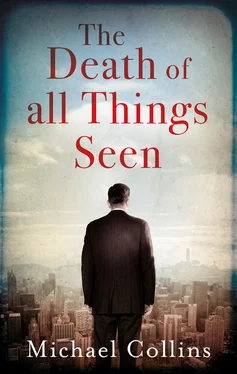Norman waited, considering how to respond, and then, as with Nate Feldman’s email, he understood that to not respond was the better option, though he continued to look at the name, Thomas Strait. It had a rural, puritanical literalism that incited a quiet interest in Norman, so he wondered, what the hell had Kenneth become mixed up in?
*
For the effect of indeterminacy, shame and humiliation, Norman called Joanne from a pay phone under the rumble of the L track.
Joanne was home and alarmed. Norman prepared himself for the onslaught. It came, and in a way it was all too easy. Norman was forthright, humble and apologetic. He explained how Mr Ahmet, legal counsel to his father, had intervened and called in favors so the charges were dropped, and how, in view of the extraordinary allowances made on his behalf, Norman had not wanted to simply hang around the courthouse. He said it all in one breath.
It was no excuse for not waiting or not calling sooner, but Joanne forgave him, as Norman knew she would have to. At the back of it was the issue of the pot that Joanne had hidden, her big screw up.
Joanne said in a kindly, disarming tone. ‘I would have liked to have met your father.’
It stopped Norman for a moment, the reach of her caring. He was on the verge of saying he was coming home when Joanne said, abruptly, ‘Is Kenneth with you?’
It was the out Norman had been seeking. He said flatly. ‘I’m a liar, is that what you think?’ A silence hung between them. There was the sound of traffic, and a train on the L.
A coin fell through the slot in the payphone, validating the fact that Norman was indeed at a payphone. He said, ‘Wait!’ He fumbled for another quarter and fed the phone and then continued contentiously, ‘Look him up on the Internet, Joanne. Mr Ahmet, defense lawyer.’
Joanne, chastened and submissive, said, ‘I don’t need to look him up. Just come home, okay?’
Norman didn’t answer her directly. There were conditions to his release. It was not as cut and dried as he had explained it. He had the name of a lawyer he had to see. There were legal documents that needed to be prepared to have the outstanding subpoena against him ‘quashed’, a legal term he pulled out of his head to add credence to his explanation.
And there was the issue, too, of the rental still out in Winnetka. Norman asked if Joanne had called Alamo since they had not returned the car. She hadn’t.
Norman said, ‘You should go get it. It’s in your name.’
Joanne let Norman finish and then she said it against herself. ‘Grace is mad at me. Earlier I wouldn’t get her McDonald’s, and you know what she said? She looked me right in the eyes and said, “I want Daddy!”’
It almost stymied Norman, but not quite.
*
Mill Shoals was a three-hour drive by Greyhound Bus into the isolated southern reaches of Illinois with its small white chapels.
Norman sat low in his seat. He had not showered in two days. He had the box from Mr Ahmet on the seat beside him like a man intent on spreading the Word with small pamphlets of righteous damnation. Whatever he was thinking of his fellow passengers, he realized they must have been thinking the same of him. Who traveled Greyhound anymore?
Every other row was left empty.
Norman had emailed Kenneth via Thomas Strait, asking Thomas to pass on the message that he was arriving via Greyhound. He gave the estimated time of arrival.
He would advance on an explanation with Joanne later. It was heartless and cruel, but there were times when the heart was set on what it wanted, what it needed.
Joanne wasn’t going anywhere. She could do nothing else but wait. In so setting Joanne aside, in admitting it to himself, Norman felt a sudden raw cold in the after rush that he was on his way. It was decided. He was on a bus.
Sleep dogged him. He was out minutes later. In sleeping, he encountered almost immediately the flash of Mr Ahmet’s face, the sifting images of photographs he had been shown, the grainy tableau of what had been the final sequence of his father and mother’s lives, and then the stark instance of Walter pointing a gun to the roof of his mouth.
He awoke some time later and, clearing the window of condensation, stared into the grim façades of old factory buildings running alongside the bus. He was seeing and not seeing them. His mind was still elsewhere. He was processing a life long passed that still played in his head in the way his early work had been communed, distilled in the first awakenings where he had so often left the warmth of Kenneth behind, evinced that the singular truth to all great art was simply showing up. It had been an unencumbered life. He quietly assessed it against what he had with Joanne and Grace.
*
If he had to make a determined judgment of absolute truth, Norman understood in his heart that Helen had not been needed in the years before Mr Feldman committed suicide, or not in the way business had once been convened. She was left idle with her dead shorthand language and spiral notebook, sequestered in her office fronting Mr Feldman’s office.
Norman had observed it, what he didn’t understand fully then, but what he would come to understand years later — the fall off in numbers at the office, the cull of staff in the downsizing of mergers and acquisitions that had begun to trim the largesse of what had once been the great flagship of American dominance. It was the great fear of Mr Feldman’s come upon America. It was in Mr Feldman’s eyes, in his unease. He said the word Imports on more than one occasion when Norman was quietly oblivious to what was being announced.
In looking back, Norman understood how there were less perks, less decorum, less allowances made for the two martini luncheons. There were no longer secretaries, but administrative assistants. New hires were required to type their own reports.
Through those unsettling years, Mr Feldman had put on a front of congeniality, his last stand against a miserable and advancing age. He called Norman ‘Fauntleroy’, owing to the get-up of blazer and slacks Helen had insisted Norman always wear when he went into the city. Mr Feldman liked snappy dressers, while Helen, always in the offing, never failed to make mention of Norman’s grades, ‘straight As’, Mr Feldman quipping, ‘I dare say Fauntleroy here will have me out of a job if I’m not careful!’
The name Fauntleroy burned a hole through Norman even now. The condescension of it! The grades were always an overture to a traditional toast, Mr Feldman pouring a measure of Scotch, and another for Norman, and for Helen, too, so they could make a toast, ‘To Fauntleroy!’ Mr Feldman downing his shot, then swooping in and drinking Norman’s shot, and what remained of Helen’s, before bustling them to lunch at his club where the report card was set out on the table as evidence of a great and burgeoning mind, and at some point in the charade, the general manager always arriving on cue, whereupon he proceeded to hold the report card up to the light to make sure it wasn’t a forgery, and, satisfied it was not, dutifully notified Fauntleroy that when he came of age, there was room for him at The Club.
It came again, a surging memory of something long sublimated, these emblazoned days set against the reality of that impoverished home life: Walter arriving home with a Dutch Apple Crumble picked from the discount rack on the occasion of all As, the goddamned sticker announcing, ‘Day-Old!’ when it might as well have read, ‘Don’t Give a Shit!’
It was always there, the abject comparison of this pathetic celebration set against the realization that there was another way, a better way, and that a man from the middle of goddamn nowhere, from Saint Cloud, Minnesota, had gained it, and that nothing had been granted him that hadn’t been earned.
Читать дальше












